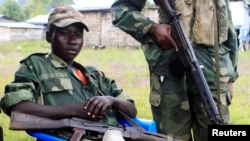GOMA, DRC —
A group of opposition leaders in the Democratic Republic of Congo is demanding an international mediator take part in upcoming talks about the country's future. The group also warns the consultations, as they are called, should not be used to push through changes to the constitution.
The plans for Congo's national consultations were announced a week ago by President Joseph Kabila. No date has been set, but the president has said the dialogue will last no more than 20 days.
A declaration signed by 63 opposition politicians and supporters sets out several objections to the way the consultations are being organized. Top on this list of complaints is the fact the plan does not refer to a role for international representatives.
Heading the list of people who signed the declaration is opposition GPLS party leader Jose Makila.
Makila told VOA the group insists there should be mediation or supervision of the consultations by the international community. He said the demand is in the spirit of a peace agreement signed by President Kabila and other heads of state at an African Union summit in February, and in line with the latest U.N. Security Council resolution on the Congo, agreed to in March.
Makila specified the people his group thinks should be supervising the dialogue.
He named the U.N. secretary general’s special envoy for the Great Lakes region, Mary Robinson, and the secretary-general’s special representative in the DRC, Martin Kobler, who is also the head of the U.N. peacekeeping mission MONUSCO.
Makila said a U.N. Security Council resolution adopted in March instructs Robinson and Kobler, in their current roles, to promote dialogue among all Congolese stakeholders to help resolve the country's problems.
VOA has learned Robinson's office does not think the resolution implies she should oversee the DRC consultations. But the U.N. peacekeeping mission thinks Kobler should be involved.
The government has yet to spell out what role it thinks Kobler and Robinson should have, if any.
Francois Nzikuye, a lawmaker from the governing coalition, said the consultations concern internal problems, so there would be no need for an international mediator. He said it would be different if a power-sharing agreement were on the agenda, but it will not be.
But opposition figures who signed the declaration say President Kabila’s victory in the 2011 election was widely rejected and they warn against attempts at the consultations to revise the constitution to allow Kabila a third term in office.
This idea has been floated by a former president of the national assembly, Evariste Boshab.
Nzikuye said Professor Boshab is an intellectual and is at liberty to think out loud. He added the idea of revising the constitution worries most people, but is worth its weight in gold.
It is unclear how many opposition deputies will attend the consultations. About 30 who signed the declaration say they will not attend unless their conditions are met, others who did not sign are also expected to boycott the meetings.
The plans for Congo's national consultations were announced a week ago by President Joseph Kabila. No date has been set, but the president has said the dialogue will last no more than 20 days.
A declaration signed by 63 opposition politicians and supporters sets out several objections to the way the consultations are being organized. Top on this list of complaints is the fact the plan does not refer to a role for international representatives.
Heading the list of people who signed the declaration is opposition GPLS party leader Jose Makila.
Makila told VOA the group insists there should be mediation or supervision of the consultations by the international community. He said the demand is in the spirit of a peace agreement signed by President Kabila and other heads of state at an African Union summit in February, and in line with the latest U.N. Security Council resolution on the Congo, agreed to in March.
Makila specified the people his group thinks should be supervising the dialogue.
He named the U.N. secretary general’s special envoy for the Great Lakes region, Mary Robinson, and the secretary-general’s special representative in the DRC, Martin Kobler, who is also the head of the U.N. peacekeeping mission MONUSCO.
Makila said a U.N. Security Council resolution adopted in March instructs Robinson and Kobler, in their current roles, to promote dialogue among all Congolese stakeholders to help resolve the country's problems.
VOA has learned Robinson's office does not think the resolution implies she should oversee the DRC consultations. But the U.N. peacekeeping mission thinks Kobler should be involved.
The government has yet to spell out what role it thinks Kobler and Robinson should have, if any.
Francois Nzikuye, a lawmaker from the governing coalition, said the consultations concern internal problems, so there would be no need for an international mediator. He said it would be different if a power-sharing agreement were on the agenda, but it will not be.
But opposition figures who signed the declaration say President Kabila’s victory in the 2011 election was widely rejected and they warn against attempts at the consultations to revise the constitution to allow Kabila a third term in office.
This idea has been floated by a former president of the national assembly, Evariste Boshab.
Nzikuye said Professor Boshab is an intellectual and is at liberty to think out loud. He added the idea of revising the constitution worries most people, but is worth its weight in gold.
It is unclear how many opposition deputies will attend the consultations. About 30 who signed the declaration say they will not attend unless their conditions are met, others who did not sign are also expected to boycott the meetings.




